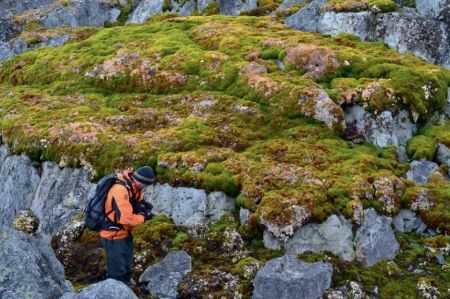Analysis of satellite data finds plant cover has increased more than tenfold over the last few decades
Plant cover across the Antarctic peninsula has soared more than tenfold over the last few decades, as the climate crisis heats up the icy continent.
Analysis of satellite data found there was less than one sq kilometre of vegetation in 1986 but there was almost 12km2 of green cover by 2021. The spread of the plants, mostly mosses, has accelerated since 2016, the researchers found.
The growth of vegetation on a continent dominated by ice and bare rock is a sign of the reach of global heating into the Antarctic, which is warming faster than the global average. The scientists warned that this spread could provide a foothold for alien invasive species into the pristine Antarctic ecosystem.
 “The Antarctic landscape is still almost entirely dominated by snow, ice and rock, with only a tiny fraction colonised by plant life,” said Dr Thomas Roland, at the University of Exeter, UK, and who co-led the study. “But that tiny fraction has grown dramatically – showing that even this vast and isolated wilderness is being affected by human-caused climate change.” The peninsula is about 500,000km2 in total.
“The Antarctic landscape is still almost entirely dominated by snow, ice and rock, with only a tiny fraction colonised by plant life,” said Dr Thomas Roland, at the University of Exeter, UK, and who co-led the study. “But that tiny fraction has grown dramatically – showing that even this vast and isolated wilderness is being affected by human-caused climate change.” The peninsula is about 500,000km2 in total.
Roland warned that future heating, which will continue until carbon emissions are halted, could bring “fundamental changes to the biology and landscape of this iconic and vulnerable region”. The study is published in the journal Nature Geoscience and based on analysis of Landsat images.
Prof Andrew Shepherd, at Northumbria University, UK, and not part of the study team, said: “This is a very interesting study and tallies with what I found when I visited Larsen Inlet [on the peninsula] a couple of years ago. We landed on a beach that was buried beneath the Larsen Ice Shelf until the shelf collapsed in 1986-88. We found it to now have a river with green algae growing in it!”
“This place had been hidden from the atmosphere for thousands of years and was colonised by plants within a couple of decades of it becoming ice free – it’s astonishing really,” he said. “It’s a barometer of climate change but also a tipping point for the region as life now has a foothold there.”
The acceleration in the spread of the mosses from 2016 coincides with the start of a marked decrease in sea ice extent around Antarctica. Warmer open seas may be leading to wetter conditions that favour plant growth, the researchers said.
Dr Olly Bartlett, at the University of Hertfordshire and also co-leader of the new study, said: “Soil in Antarctica is mostly poor or nonexistent, but this increase in plant life will add organic matter, and facilitate soil formation. This raises the risk of non-native and invasive species arriving, possibly carried by eco-tourists, scientists or other visitors to the continent.”
Courtesy: Guardian News & Media Ltd
Disclaimer : PunjabTodayNews.com and other platforms of the Punjab Today group strive to include views and opinions from across the entire spectrum, but by no means do we agree with everything we publish. Our efforts and editorial choices consistently underscore our authors’ right to the freedom of speech. However, it should be clear to all readers that individual authors are responsible for the information, ideas or opinions in their articles, and very often, these do not reflect the views of PunjabTodayNews.com or other platforms of the group. Punjab Today does not assume any responsibility or liability for the views of authors whose work appears here.
Punjab Today believes in serious, engaging, narrative journalism at a time when mainstream media houses seem to have given up on long-form writing and news television has blurred or altogether erased the lines between news and slapstick entertainment. We at Punjab Today believe that readers such as yourself appreciate cerebral journalism, and would like you to hold us against the best international industry standards. Brickbats are welcome even more than bouquets, though an occasional pat on the back is always encouraging. Good journalism can be a lifeline in these uncertain times worldwide. You can support us in myriad ways. To begin with, by spreading word about us and forwarding this reportage. Stay engaged.
— Team PT

